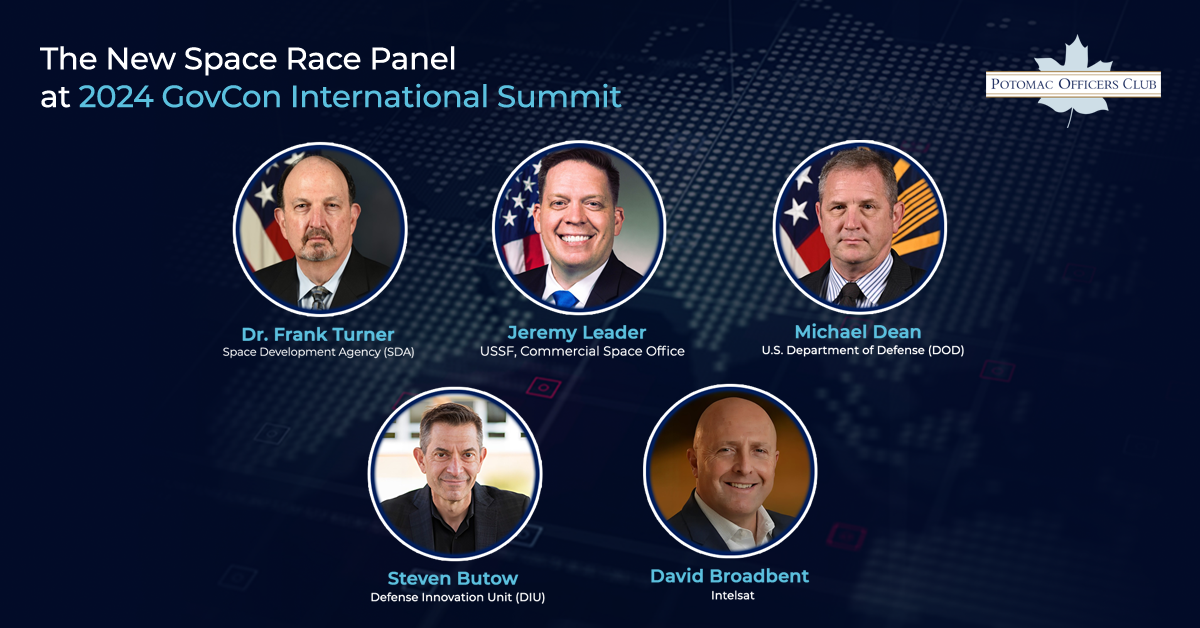Through two major plans this year, the Department of Defense announced its intention to take seriously the need for commercial space products. The DOD Commercial Space Integration Strategy and the U.S. Space Force’s Commercial Space Strategy were released within weeks of one another in April and declared that the rapid advancements taking place across the world in the space domain have brought with them an increased competition among nations.
“The Space Force has formalized how we want to move forward with commercial industry in a new approach to reset and improve our connection to the space economy; we need their innovations,” commented Lt. Gen. Shawn Bratton, deputy chief of space operations, strategy, plans, programs and requirements, when the strategies debuted.
A panel at Potomac Officers Club’s upcoming 2024 GovCon International Summit will tackle how the global competition for space dominance is playing out and identify the technologies the U.S. government and military needs from industry to stay out ahead of adversaries. Don’t miss this vital discussion and packed day of GovCon networking, set for Oct. 10 at the Hilton Alexandria Mark Center in Virginia.
Space Tech Panel Focus Areas
Entitled “The New Space Race: Can Technology Keep Up With the Threat?,” the GovCon International Summit panel session will train its focus on several important aspects of this multifaceted issue. These include the speed of technical capabilities and if they’ll be able to match the speed of threats and how the U.S. can put the right systems in place to properly safeguard its architectures.
The panel’s participants — who are all DOD officials — will also go deep on the best ways industry can partner with the public sector to sustain U.S. hegemony in the space domain. Finally, panelists will predict where they see the space domain going next.
Meet the Panelists

Maj. Gen. Steven “Bucky” Butow
Affectionately dubbed “Bucky,” Maj. Gen. Butow is military deputy and director of the space portfolio at the Defense Innovation Unit and a big proponent of finding a better way for the DOD to contract technology from industry. He told Space News he wants to steer away from “exquisite,” one-of-a-kind, unreplicable systems and toward products that can be scaled.
“We have to relearn how to work with the commercial sector. We have to be early adopters and willing users of the commercial technology, even if it just solves 80 percent of our problem today,” Butow said.

Michael Dean
Dean, who is director of the Command, Control and Communications Infrastructure Office within the Office of the DOD Chief Information Officer, will bring a specifically C3-concentrated bent to his remarks on the panel. His responsibilities in his current role include legislating the Pentagon’s tactical communications and data links, combat identification systems, public safety communications and more.
Regarding space tech, Dean has said, “a lot of people, when they think of space-based capabilities, they always forget the ground segment.” During a 2022 conference, he shared that “virtualization and digitization” are crucial pieces to the Pentagon’s establishment of an effective ground satellite communications system. This is due to the DOD’s “hybrid, heterogeneous space segment of multiple orbits, which have all these different paths to traverse our data.”

Jeremy Leader
At a luncheon in January, U.S. Space Force Commercial Space Office Deputy Director Leader said the USSF is embracing a “buy rather than build” approach to space technology. On this he aligns with Maj. Gen. Butow’s perspective — “If something is commercially available, we’ll buy it. Why build our own exquisite systems?” Leader remarked. “It’s been an interesting journey but I’d say we’re at just a few steps on the path and that there’s more coming.”
Leader, who is a longtime DOD servant with time spent deployed in Iraq in the 2000s as an engineer, told Washington Technology that Space Force’s priority areas for 2024 are “space-based environmental monitoring and weather; training and test environments; and developing an alternative to positioning, navigation and timing.”

Dr. Frank Turner
Space Development Agency Technical Director Turner is on the same page with his panelists in working doggedly toward a more fluid pipeline between industry and government.
“We want a marketplace where people can go buy what they need to buy and be able to use it, and there are multiple sources that have the capability of providing things to the government, to other companies and to this enterprise,” Turner said during an ExecutiveBiz event last year.
Turner has a storied career, beginning as an officer in the U.S. Air Force, subsequently spending nearly a decade at Northrop Grumman as a program manager. Before coming aboard the SDA, he was an electronics engineer at the Naval Research Laboratory.

David Broadbent
Broadbent is a known quantity in the government contracting space, having logged over 20 years at Raytheon in positions of increasing responsibility—culminating in a run as president of its space systems division. Broadbent came to Intelsat as president of government solutions in November 2023.
“The government must find ways to quickly frame new requirements, accelerate new technologies and understand the best solutions available from the commercial industry. To do this, government leaders need help — urgently — from current Space Force prime contractors, like the one I lead,” Broadbent wrote in a Space News opinion piece.
“Making use of innovation from industry doesn’t just mean finding best-in-class data capabilities in Silicon Valley or hardening commercial technology for space. It also means adopting a new mindset for traditional space contractors,” he continued.
Join the Potomac Officers Club’s 2024 GovCon International Summit as Broadbent leads an impassioned, informed discussion between these influential experts on Oct. 10!




